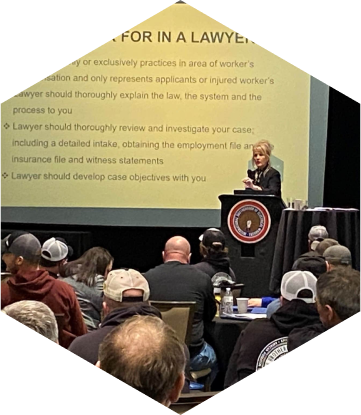Traumatic Brain Injuries
An Experienced Workers’ Compensation Lawyer Representing TBI Victims in Wisconsin
Traumatic brain injuries, also known as TBIs, are among the most serious injuries you can sustain. Even mild TBIs can leave victims with long-term issues that can affect their daily lives, and severe TBIs may result in issues that prevent people from working or even living alone.
When people sustain TBIs at work, they are typically entitled to benefits through their employers’ workers’ compensation insurance. That said, obtaining workers’ compensation benefits can be an uphill battle, as insurance companies always try to settle cases for as little as possible. In fact, if they can find any way to justify denying your claim altogether, they will.
Fortunately, as an injured worker, you have rights. One of these rights is to retain an experienced attorney like Lisa A. Wiebusch to advocate on your behalf during your workers’ compensation claim. An experienced attorney can file your claim for you and attempt to negotiate a fair settlement that gets you the benefits you deserve under Wisconsin law. To schedule a free case evaluation with a Wisconsin workers’ compensation lawyer, call our office today.
TBIs Can Happen Where You Least Expect It
When most people think of traumatic brain injuries (TBIs), they often associate them with high-risk occupations like construction, manufacturing, or professional sports. While it’s true that these industries carry an elevated risk of TBIs, it’s essential to understand that TBIs can occur anywhere, even in seemingly safe and low-risk work environments. For example, TBIs can affect people in the following lines of employment:
Office Work
Contrary to popular belief, office work is not immune to the risk of TBIs. While employees in office settings may not face the same physical hazards as those in construction, they are still susceptible to head injuries. Common office related TBI causes include slip and fall accidents, falling objects, and workplace violence incidents. It's crucial for office workers to be aware of these risks and take necessary precautions to prevent TBIs.
Retail Jobs
Retail jobs may seem safe, but the bustling nature of these environments can lead to accidents. Slippery floors, crowded aisles, and heavy merchandise can all contribute to TBI incidents. Additionally, employees who work with machinery or equipment, such as forklifts or stockroom equipment, may face a higher risk of head injuries.
Jobs Requiring Driving
Professions that involve driving, such as delivery drivers, truck drivers, and sales representatives, can expose workers to the risk of TBIs due to motor vehicle accidents. Collisions on the road can result in severe head injuries, even when safety precautions are taken. Employers should enforce strict safety policies, including regular vehicle maintenance and driver training, to mitigate TBI risks for employees on the road.
What Kinds of Accidents Cause TBIs ?
TBIs can happen in a wide variety of accidents, including those that may not seem like they could cause serious injuries. Some of the more common accidents that can result in traumatic brain injuries include:
Falls
Falls are a leading cause of TBIs across all industries. They can happen in any workplace or environment. Whether it's a slip and fall on a wet floor in an office, a trip on uneven terrain at a construction site, or a stumble in a retail store, head injuries from falls can be severe. Employers should take steps to prevent falls by maintaining safe walking surfaces and providing proper signage and training for employees.
Struck by Objects
Being struck by objects is a significant risk for workers in industries involving heavy machinery or equipment, such as construction, manufacturing, and warehousing. Falling tools, equipment, or debris can result in head injuries. Employers should enforce strict safety protocols, including the use of personal protective equipment (PPE) and secure storage of objects, to reduce the risk of TBIs.
Motor Vehicle Accidents
Jobs that require driving, such as trucking or delivery services, carry the risk of motor vehicle accidents. Collisions on the road can lead to TBIs, even when seat belts are worn. Employers should prioritize driver safety by ensuring vehicles are well-maintained, providing proper training, and enforcing fatigue management measures.
Explosions and Blasts
In certain industries, such as the military, mining, or construction, workers may be exposed to explosions or blasts. These incidents can cause concussions and more severe TBIs. Employers must provide specialized training and protective gear to minimize the risk of head injuries in such hazardous environments.
TBIs Can Cause Long-Term Problems
Traumatic brain injuries (TBIs) are not just immediate medical concerns; they can have far-reaching consequences that affect an individual’s life for years to come. In many cases, victims cannot return to work for weeks or months – if they can return at all.
While the severity of a TBI can vary, it’s essential to understand that even seemingly minor head injuries can lead to long-term problems. Some of the more common issues that TBIs can cause include the following:
Cognitive Impairment
TBIs often result in cognitive impairments that can persist long after the initial injury. These may include difficulties with memory, attention, concentration, and problem-solving. Individuals with TBIs may find it challenging to perform daily tasks or excel at work or school, leading to frustration and reduced quality of life.
Emotional and Behavioral Changes
TBIs can also lead to significant emotional and behavioral changes. Individuals may experience mood swings, irritability, depression, anxiety, or impulsivity. These changes can strain personal relationships and make it difficult to maintain employment or social activities.
Physical Impairment
Depending on the location and severity of the TBI, individuals may experience physical impairments that endure over time. These can include weakness, coordination problems, and difficulties with balance or motor skills. These physical challenges may necessitate ongoing rehabilitation and therapy.
Sensory and Perceptual Issues
TBIs can affect an individual's sensory and perceptual functions, leading to problems with vision, hearing, or the sense of taste and smell. These issues can impact one's overall quality of life and ability to engage with the world.
Headaches and Sleep Disorders
Many individuals with TBIs suffer from persistent headaches and sleep disorders, such as insomnia or sleep apnea. These conditions can exacerbate cognitive and emotional difficulties, creating a vicious cycle of health challenges.
Protecting Your Rights after a Work-Related TBI
If you sustain a brain injury while you are at work or engaging in a work-related task, if possible, you should take certain steps to protect your rights. If you do not, you could make it easier for the insurance company to deny your claim or minimize your workers’ compensation benefits. Some of the most important steps to take after suffering a TBI at work include:
Seek Immediate Medical Attention
Your health should be your top priority. If you suspect or experience symptoms of a TBI, such as loss of consciousness, confusion, headache, nausea, or memory problems, seek medical attention immediately. Delaying medical evaluation and treatment can worsen the injury and complicate your recovery.
Consult with an Attorney
Consider consulting with a skilled workers' compensation attorney like Lisa A. Wiebusch. She can help you understand your rights, navigate the complex legal process, and ensure you receive the compensation you deserve. Lisa Wiebusch will also help you gather the necessary evidence to support your claim.
Report the Incident to Your Employer
Notify your employer or supervisor about the TBI as soon as possible. This is typically a necessary step for filing a workers' compensation claim. Be sure to provide details about how the injury occurred and any witnesses to the incident.
Document the Incident
Keep detailed records of the incident, your injuries, and any medical treatment you receive. This documentation can be crucial when filing a workers' compensation claim or pursuing legal action. If possible, take photos of the accident scene, if possible, and retain copies of all relevant medical reports and bills.
Follow Medical Advice
Adhere to your medical treatment plan and attend all follow-up appointments. TBIs may require ongoing care, rehabilitation, and therapy to maximize your recovery. Compliance with medical recommendations can strengthen your case and demonstrate the severity of your injury.
Communicate with Your Employer and Insurance Company
Maintain open communication with your employer and the workers' compensation insurance company. Keep them informed of your progress and any changes in your medical condition. This will help ensure your benefits are processed correctly.
Know Your Rights
Educate yourself about your rights as an injured worker. In Wisconsin, you have the right to workers' compensation benefits, which may include medical expenses, wage replacement, vocational rehabilitation, and more. An experienced attorney like Lisa A Wiebusch can provide guidance on what benefits you are entitled to.
Suffered a TBI at Work? Call a Wisconsin Worker’ Compensation Lawyer Today
If you have sustained a traumatic brain injury while at work, you should contact an attorney as soon as you can. Attorney Lisa A. Wiebusch has been helping injured workers get the benefits they deserve for more than 30 years and knows how to get workers’ compensation insurers to pay up. To schedule a free case evaluation with Ms. Wiebusch, call our office today or send us an email through our online contact form.
Areas of Practice

Attorney Lisa Wiebusch presenting at the IBEW Stewards Conference May of 2022

Call my Wausau law office at 715-298-2244 or email me. I represent injured workers in any occupation and statewide.

